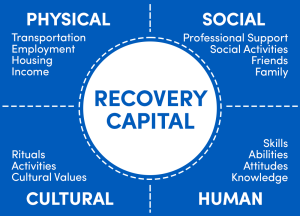Changing What We Cannot Accept: Climate Change and Addiction Recovery
As growing evidence shows that climate change will influence nearly every aspect of our health, a University at Buffalo School of Social Work researcher explores how climate change may affect individuals who are recovering from addiction.
Using the theory of recovery capital, Associate Professor Elizabeth Bowen, PhD, outlines many ways climate change may impact addiction recovery, including how marginalization because of race, income or age could magnify these effects for particular groups. While other studies have examined the effect of climate change on substance use rates, Bowen’s work, which was published in the journal Addiction Research & Theory, is the first peer-reviewed article to look at its implications for addiction recovery.
The video above — animated by Jon Bonebrake and produced by the UB School of Social Work — outlines Bowen's key findings and action steps for researchers, practitioners and individuals in recovery.
Explore further
Recovery capital captures the full spectrum of resources that impact an individual's recovery from problems with alcohol or other drugs. It includes things that support someone's recovery, and things that make recovery harder. Recovery capital includes:
Social capital: Friends, family members and others who support a person’s recovery journey. Examples: A close friend who is also in recovery and provides wisdom and encouragement; a spouse who is not in recovery but supports your recovery goals.
Physical capital: Money, jobs, stable housing, transportation and other resources that provide a foundation for recovery. Examples: Health insurance that pays for substance use treatment; a car you can use to go to AA meetings and recreational activities.
Human capital: Skills, attitudes, knowledge, health attributes and interests that help in recovery. Examples: A sense of spirituality that helps you feel optimistic about recovery; having skills to effectively cope with stress and triggers.
Cultural capital: Cultural values, rituals and community-level resources that support recovery. Examples: Taking part in cultural activities that celebrate recovery; living in a neighborhood that feels safe and welcoming.
Robert Granfield and William Cloud, professors from UB and the University of Denver, respectively, first studied recovery capital more than 20 years ago. Since then, other scholars have researched recovery capital with a variety of populations. In 2023, Bowen, Granfield and their colleagues developed a tool to measure recovery capital, the Multidimensional Inventory of Recovery Capital.
Bowen's paper outlines several pathways through which climate change may reduce recovery capital and negatively affect recovery outcomes:
Social capital
- Disrupt social networks
- Reduce social connections
Physical capital
- Increase unemployment
- Increase housing instability
- Disrupt transportation
Human capital
- Worsen health
- Increase anxiety
- Increase existential crises
- Reduce educational opportunity
Cultural capital
- Threaten cultural activities
- Decrease resource access
- Reduce event participation
- Increase stigma
Ultimately, Bowen hypothesizes that the effects of climate change on recovery capital will lead to adverse recovery outcomes, including lower rates of abstinence or moderate substance use; lower retention in treatment; recurrence of substance use disorder symptoms; and decreased quality of life.
The influence of marginalization
The extent to which climate change affects an individual's recovery journey will be influenced by many factors, including:
- Racism
- Socioeconomic oppression
- Sexism
- Heterosexism
- Age and generation
- Geographic location
- Time in recovery
Are you working on the issues of climate change or addiction recovery? Tell us how you think these issues are connected — and how we can address them.
Learn more about climate change, climate justice and addiction recovery:
Cite this resource
University at Buffalo School of Social Work. (2024). Changing What We Cannot Accept: Climate Change and Addiction Recovery. https://socialwork.buffalo.edu/climate-and-recovery.
Published October 14, 2024


